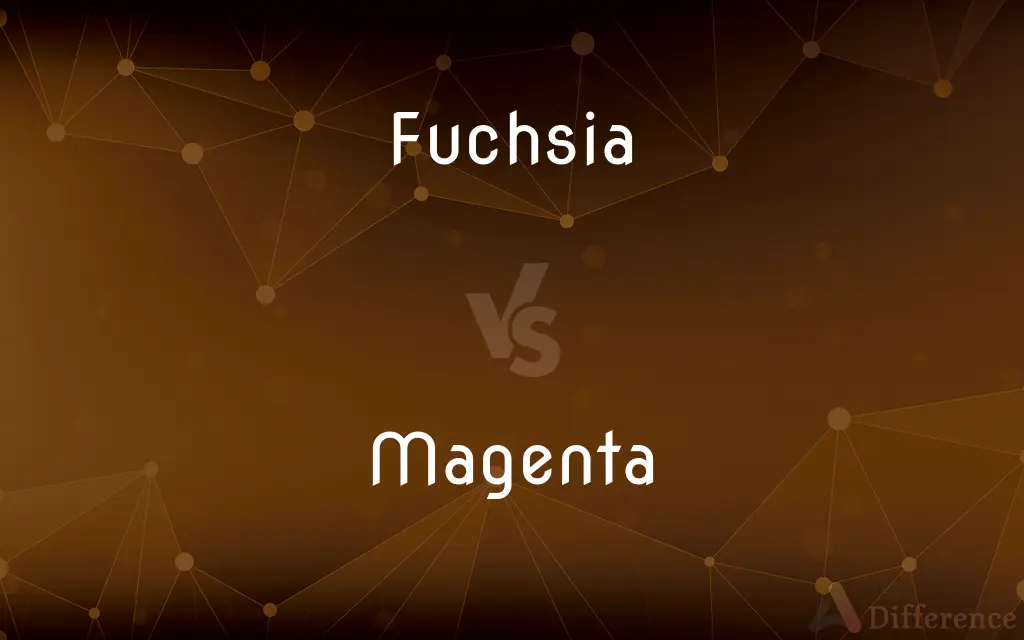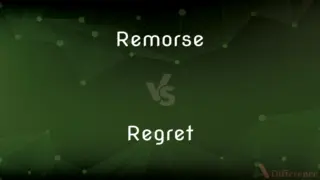Fuchsia vs. Magenta — What's the Difference?
Edited by Tayyaba Rehman — By Fiza Rafique — Updated on September 21, 2023
Fuchsia is a bright pink-purple color named after the flower of the fuchsia plant. Magenta is a purplish-red hue that exists between blue and red in the color spectrum. While both are vivid colors, fuchsia leans more toward purple.

Difference Between Fuchsia and Magenta
Table of Contents
ADVERTISEMENT
Key Differences
Fuchsia is a vibrant color that falls in the realm of pink and purple shades. It derives its name from the fuchsia plant, which has similarly-colored flowers. In various color models, like the RGB or the CMYK, fuchsia is often created by combining full intensities of red and blue light.
Magenta, on the other hand, is another lively color that exists between the primary colors of red and blue. Often described as a purplish-red, magenta is frequently used in printing and digital designs. In the CMYK color model, magenta is actually one of the primary colors, along with cyan, yellow, and black.
While both fuchsia and magenta are blends of red and blue, they differ primarily in their visual temperature and the balance of these base colors. Fuchsia leans more toward the purple end, often incorporating a greater blue component. Magenta, however, is often seen as warmer, with a more significant red component.
In everyday usage, the terms fuchsia and magenta are often used interchangeably, particularly for laypeople who are not involved in specialized fields like design or printing. Despite this, professionals in these fields make clear distinctions between the two, as the subtleties in hue can make a significant difference in a project.
Comparison Chart
Color Family
Pink-Purple
Purplish-Red
ADVERTISEMENT
Origin
Named after the fuchsia plant's flower
Exists between red and blue in spectrum
Primary Component
More blue
More red
Usage in Design
Less common in printing
Primary color in CMYK model
Popular Understanding
Often confused with magenta
Often confused with fuchsia
Compare with Definitions
Fuchsia
A bright pink-purple color.
The bridesmaids wore dresses in a stunning fuchsia.
Magenta
A purplish-red color.
The magazine cover featured bold text in magenta.
Fuchsia
Often seen in fashion and interior design.
Fuchsia accents enlivened the otherwise monochrome room.
Magenta
Frequently used in digital designs.
The logo's magenta elements really popped on screen.
Fuchsia
Less commonly used in professional printing.
Fuchsia ink is rarely used in standard CMYK printing.
Magenta
One of the primary colors in the CMYK model.
Magenta ink was replaced frequently in the printing press.
Fuchsia
Named after the flower of the fuchsia plant.
She adorned her hat with a fuchsia ribbon to match the fuchsia blossoms.
Magenta
Exists between blue and red in the color spectrum.
Magenta was the perfect color to transition from red to blue in the painting.
Fuchsia
Fuchsia ( ) is a genus of flowering plants that consists mostly of shrubs or small trees. The first to be scientifically described, Fuchsia triphylla, was discovered on the Caribbean island of Hispaniola (Haiti and the Dominican Republic) about 1696–1697 by the French Minim monk and botanist, Charles Plumier, during his third expedition to the Greater Antilles.
Magenta
Magenta () is a color that is variously defined as purplish-red, reddish-purple or mauvish-crimson. On color wheels of the RGB (additive) and CMY (subtractive) color models, it is located exactly midway between red and blue.
Fuchsia
A shrub with pendulous tubular flowers that are typically of two contrasting colours. They are native to America and New Zealand and are commonly grown as ornamentals.
Magenta
A light mauvish-crimson which is one of the primary subtractive colours, complementary to green
A short magenta dress
Bright pink double flowers each lined in dark magenta
Fuchsia
Any of various tropical shrubs or trees of the genus Fuchsia, widely cultivated for their showy, drooping, purplish, reddish, or white flowers.
Magenta
See fuchsin.
Fuchsia
A strong, vivid purplish red.
Magenta
A purplish red, one of the subtractive primary colors.
Fuchsia
A popular garden plant, of the genus Fuchsia, of the Onagraceae family, shrubs with red, pink or purple flowers.
Magenta
A vibrant light purple, purplish-red, reddish-purple, or pinkish purple colour obtained by mixing red and blue light (thus a secondary colour), but primary in the CMYK colour system used in printing.
Fuchsia
A purplish-red colour, the color of fuchsin, an aniline dye.
Magenta
Having the colour of fuchsia, fuchsine, light purple.
Fuchsia
Having a purplish-red colour.
Magenta
An aniline dye obtained as an amorphous substance having a green bronze surface color, which dissolves to a shade of red; also, the color; - so called from Magenta, in Italy, in allusion to the battle fought there about the time the dye was discovered. Called also fuchsin, fuchsine, roseïne, etc.
Fuchsia
A genus of flowering plants having elegant drooping flowers, with four sepals, four petals, eight stamens, and a single pistil. They are natives of Mexico and South America. Double-flowered varieties are now common in cultivation.
Magenta
The purplish-red color of magenta.
Fuchsia
A plant belonging to the genus Fuschia.
Magenta
A dark purple-red; the dye was discovered in 1859, the year of the battle of Magenta
Fuchsia
Any of various tropical shrubs widely cultivated for their showy drooping purplish or reddish or white flowers; Central and South America and New Zealand and Tahiti
Magenta
A battle in 1859 in which the French and Sardinian forces under Napoleon III defeated the Austrians under Francis Joseph I
Fuchsia
A dark purple-red; the dye was discovered in 1859, the year of the battle of Magenta
Magenta
Deep purplish red
Fuchsia
A vivid hue combining red and blue.
The fuchsia sunset was truly a sight to behold.
Magenta
A warmer tone than fuchsia.
She opted for a magenta scarf to bring warmth to her outfit.
Common Curiosities
What is magenta?
Magenta is a purplish-red color that exists between red and blue in the color spectrum.
Are fuchsia and magenta the same?
No, fuchsia leans more toward purple while magenta leans more toward red.
Is magenta a primary color in any color model?
Yes, it's a primary color in the CMYK color model.
Is fuchsia a natural color?
Yes, it's named after the fuchsia plant's flower.
Which is warmer, fuchsia or magenta?
Magenta is often considered warmer as it leans more toward red.
Is fuchsia used in printing?
It's less commonly used than magenta in standard CMYK printing.
What is fuchsia?
Fuchsia is a bright pink-purple color named after the fuchsia flower.
Which has more blue, fuchsia or magenta?
Fuchsia generally has more blue.
Is magenta used in fashion?
Yes, it's a popular choice for clothing and accessories.
Can fuchsia and magenta be used interchangeably?
In casual usage, yes, but not in specialized fields like design or printing.
Do fuchsia and magenta have symbolic meanings?
They can symbolize confidence and energy but interpretations vary.
Is magenta common in interior design?
It can be used as an accent color but is less common as a main color.
What industries primarily use magenta?
Printing and digital design frequently use magenta.
What RGB values create fuchsia?
Fuchsia is often created by combining full intensities of red and blue light.
Is fuchsia a modern color?
While not new, it remains popular in modern fashion and design.
Share Your Discovery

Previous Comparison
Support vs. Encourage
Next Comparison
Remorse vs. RegretAuthor Spotlight
Written by
Fiza RafiqueFiza Rafique is a skilled content writer at AskDifference.com, where she meticulously refines and enhances written pieces. Drawing from her vast editorial expertise, Fiza ensures clarity, accuracy, and precision in every article. Passionate about language, she continually seeks to elevate the quality of content for readers worldwide.
Edited by
Tayyaba RehmanTayyaba Rehman is a distinguished writer, currently serving as a primary contributor to askdifference.com. As a researcher in semantics and etymology, Tayyaba's passion for the complexity of languages and their distinctions has found a perfect home on the platform. Tayyaba delves into the intricacies of language, distinguishing between commonly confused words and phrases, thereby providing clarity for readers worldwide.















































